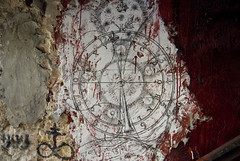Some days I despair of writing interesting book reviews. Posts that always echo similar sentiments get boring fast, but the relentless pressure of the marketplace has led to very few truly terrible titles getting released. That's a shame since it's always fun to publically skewer a howler. What's a reviewer to do when every title he picks up fails to fall below the line of "basically decent"? Well, in my case I've decided to look at something other than the nuts and bolts of narrative: I want to see whether or not a book gets me excited. Subjective, I know, but any title that keeps you turning the pages long after reason has started reminding you of other urgent tasks must be doing something right. And Quintessence, a slipstream history by Philip K. Dick Award-winner David Walton, proved just such a book.
It is sixteenth-century England, but few would recognize this alternate Albion. True, sickly Edward the Sixth still sits on the throne, and Bloody Mary waits in the wings for his death, ready to return the nation to the true Catholic faith by any means necessary. Much else, though, has changed. Christopher Columbus' expedition never returned to Spain, thus proving what everyone already knew -- the world is indeed flat and the watery deeps teem with ferocious monsters. What's more, alchemy is a true science, which vexes royal physician Stephen Parris to no end. A staunchly idealistic Protestant, he believes in the open sharing of scientific information rather than cloaking it with cabalistic codes. But when a ghost ship filled with dead sailors drifts into London and Parris gets caught dissecting their strangely altered bodies, he finds himself with a difficult choice to make: Face summary execution for forbidden vivisection or sail with brash alchemist Christopher Sinclair on the same deadly course that felled the aforementioned sailors. Not that death bothers Sinclair that much. He believes the cure for mortality itself can be found all the way at the earth's edge ...
Were you to examine Quintessence's component parts, you might think it offers nothing that speculative fiction hasn't tackled before. A killer imaginative premise. A setting split by religious and philosophical tribalism. Serious consideration of scientific concerns. But the old cliché holds true: The book really is more than the sum of its parts. Or to use a more apropos metaphor, Walton compounds those individual elements into a fresh, distinct substance. Open Quintessence at random, and you may find, say, characters debating whether the theory of atomism renders the universe godless as they try to comprehend how a school of fantastic fish can transmute their bodies into iron. It's seamless, synergistic, and Walton deserves kudos for such deft composition. Also, his treatment of spirituality could serve as a blueprint for anyone interested in tackling such subjects. By divvying up religious perspectives among four different characters -- a protestant, a catholic, a Jew, and a skeptic -- he manages to seriously examine questions of faith without ever coming off as flippant or polemical. Alas, such sophistication falls away in the final act, which mixes high-fantasy tropes with (of all things) superhero conventions. Even a slightly disappointing conclusion, though, can't erase the fact that Quintessence is an excellent, exciting effort. Tolle lege: Take and read.
(Picture: CC 2009 by thierry ehrmann)
Friday, October 18, 2013
Subscribe to:
Post Comments (Atom)



No comments:
Post a Comment